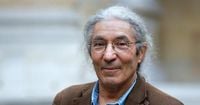In a developing story centered on the legal troubles of Franco-Algerian writer Boualem Sansal, French President Emmanuel Macron has expressed his desire for a swift resolution that would see Sansal regain his freedom. This statement, made on March 20, 2025, comes as Sansal faces serious accusations in Algeria, namely that of undermining the country's territorial integrity, with a request for a ten-year prison sentence hanging over him.
Macron's comments were made following a press conference that followed a European summit in Brussels. "What happened is very serious, but I trust President Tebboune and his insight to see that this is not serious, and that we are dealing with a great writer, who is also ill," Macron stated. His remarks highlight not only his concern for Sansal's well-being but also serve as an implicit critique of the Algerian legal proceedings against him.
Sansal, who has been imprisoned since November 16, 2024, is facing allegations that have ignited considerable tensions between Algeria and France. The charges include undermining national unity and practices that threaten national security. The prosecutor near Algiers has decided to seek a sentence of ten years for Sansal, a move that many see as politically motivated due to his propensity to criticize the Algerian government.
Macron emphasized the humanitarian aspect of the situation, indicating that the resolution should be guided by dignity and the welfare of Sansal. "Our wish is for Boualem Sansal to receive treatment, be released, and go where he wants to go. And if he wants to leave Algeria, let him leave," he added, urging that a quick resolution is vital. An important court verdict is expected on March 27, 2025, which will decide the novelist's fate.
Details from the trial reveal that Sansal was present in court without a lawyer, as he opted to defend himself. Boualem Sansal’s French attorney, Me François Zimeray, has been extremely vocal about the nature of the trial, describing it as "a phantom trial held in the greatest secrecy, without defense, incompatible with the very idea of justice." His insights were reported by the AFP, underscoring the problematic nature of legal representation in Algeria, particularly for those facing political charges.
During the proceedings, Sansal reportedly expressed, "I expressed an opinion as any Algerian citizen," denying any conduct intended to harm state interests. Despite the serious implications of the charges leveled against him, Sansal has maintained that his expressions were never intended to undermine the Algerian state.
The backdrop of this situation is further complicated by the comments of French Interior Minister Bruno Retailleau, who has threatened to repeal bilateral migration agreements as a form of "graduated response" to Algeria’s handling of this case. His remarks reflect the ongoing diplomatic tensions between the two countries, heightened by issues related to migration and bilateral relations, which have faced strain in recent years.
The upcoming court judgment on March 27 will likely not only impact Sansal's life but could also have broader implications for Franco-Algerian relations. Analysts and diplomats alike are watching closely, as Macron's administration navigates this sensitive terrain while trying to uphold human rights standards and address matters of sovereignty with Algeria.
As the clock ticks down to the verdict, the stakes have risen from personal to diplomatic, as the perceptions of justice and the treatment of dissenters in Algeria come sharply into focus. In a world increasingly attuned to the nuances of state power and individual rights, the case of Boualem Sansal serves as a striking reminder of the balance between freedom of expression and governmental control.
Both countries find themselves at a crossroads; Algeria must consider the implications of its judicial decisions on its international reputation, while France grapples with its historical ties to Algeria, now shadowed by these legal and human rights concerns. This balancing act will prove critical not only for the fate of one writer but for the relationship between two nations long intertwined in complex historical narratives.
With Macron's public backing, the narrative continues to evolve, and the world awaits the outcome of a case that reflects far more than just the fate of Boualem Sansal. It encapsulates the intricate layers of law, politics, and ethics, leaving observers to ponder: What price for freedom?





